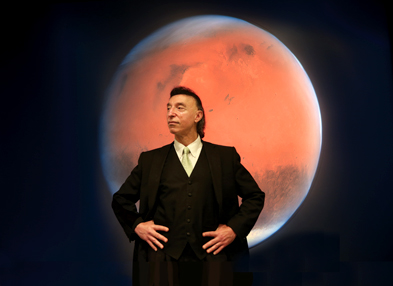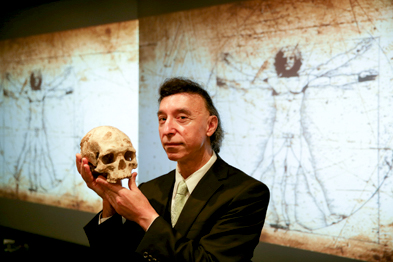How far can we go?

Dr Arthur Saniotis Humans are always pushing the boundaries, from exploring space to doubling our lifespan in just six generations.
"The 20th century was the age of physics. The 21st century is the age of biology.”
That’s according to Dr Arthur Saniotis, lecturer in human anatomy and evolution in the University’s School of Medicine.
Dr Saniotis is a self-confessed futurist who applies his thinking to key issues facing humankind, and the factors that will shape our evolution as a species. Issues such as: can we continue to push the human lifespan further by decades, even centuries? And what will it take to get humans to safely travel to Mars, and beyond?
“The two issues are uniquely linked in many ways. Biology is a key part of the story but technology also has a huge role to play,” Dr Saniotis says.
“As a species, we’ve been modifying ourselves since the beginning. When we created fire, it was a modification to who we were and what we were capable of. Tool making is a hallmark of our species, as is language, and both of these things have resulted in a range of physical and cognitive adaptations that have made us who we are today,” he says.
“This century we’re going to see vast modifications in biological organisms, such as through genetic manipulation, stem cell technology, nanotechnology. The scope of medicine and health services is changing from being focused on saving people’s lives to altering people.”
The current life expectancy for Australians is 85 years for women and 83 for men. How possible is it for humans to keep pushing the limits of our lifespan? Can we ever expect to live to 1000? Dr Saniotis doesn’t think a “millennial human” is within our reach, but he says people might conceivably be able to live for hundreds of years.
“Prior to the Industrial Revolution not as many people lived beyond 60 years of age. In 1850, the average life expectancy was 40 years. Today, that life expectancy is doubled and there are now tens of thousands of people in the world who live beyond 100 years. In Japan alone there are about 60,000 centenarians, which is an incredible number,” Dr Saniotis says.
“Since the mid 20th century, we’ve given people in the developed world 20-30 years of extra life. This is quite miraculous, and it’s occurred within a relatively short time in human history.”

Dr Arthur Saniotis Dr Saniotis says a range of health and social issues for older people – such as Parkinson’s and Alzheimer’s disease and dementia, as well as cancer – are currently major hurdles for the quality of older life. But if medical science is able to tackle these issues, what can we expect for the future of the human race?
“The nature of our whole society would have to change,” Dr Saniotis says. “Our notions of ageing and youth, concepts of family, our sexual patterns and relationships, our concepts of work and retirement, social security systems, the food industry, medicine, all of this will change.”
Dr Saniotis poses a further issue: “What if you want to live for centuries but no-one else around you wants to live that long? The rest of your life will see continuous loss; it would be too much for most people. So while physically we might be able to modify and adapt to extend life, it’s possible that for many people it would be psychologically damaging.”
Dr Saniotis says space travel is also a double-edged sword.
“It would take about six months for a manned spaceship to reach Mars, and another six months to return. At the current time, scientists have yet to devise a method to protect astronauts from the amount of cosmic radiation they would be exposed to during long-term space travel.
“Assuming that problem is somehow solved, my main concern is helping to reduce the physical and neurological deprivation that astronauts would experience on such a journey,” he says.
“Over the last 30 years authorities have been monitoring people on space stations, particularly on the Russian space station Mir. And you can see so many problems occurring: from changes in blood circulation due to microgravity, muscle and skeletal loss, neurological deficits, and behavioural issues due to stress levels and lack of sleep.”
Dr Saniotis says although astronauts already conduct exercises to maintain physical and mental health, it’s not enough to replace the kind of stimulation they would receive on Earth. And there’s another key factor in all of this: people’s connection to nature.
“It’s known that astronauts who see the Earth from their little portal windows feel a sense of psychological connectedness with it. So even if you can see a small image of Earth, it gives you a sense of stress relief. What will happen when you go into deep space and you no longer have that image?
“The famous naturalist E.O. Wilson posed the theory of ‘biophilia’ – love for nature – that human beings evolved in nature and they are indelibly connected with it. We know that from past research, people in hospitals who see images of nature after an operation have higher rates of healing than those who don’t.
“If you’re cooped up in a spaceship for months on end, and you’re deprived of this connection, you’ll be experiencing stress on multiple levels in addition to other stresses of being in space, and that’s not good for you physically or mentally.”
Dr Saniotis says mindfulness meditation is one technique that should be used for astronauts, prior to, during and after the mission. “Even just a few minutes of meditation will reduce stress hormones, increase calmness and relaxation, and protect your brain.”
In this regard, astronauts and those looking for longer, healthier lives have something in common: “Studies have shown that daily meditation and walking can reduce ageing in older people. This activity gives you a better sense of calm, and enables your immune system to work better.”
Dr Saniotis says there’s “nothing magical about this formula”. And you don’t have to be on a mission to Mars to benefit from it.
|
|
Media Contact:
Media Office
Email: media@adelaide.edu.au
Website:
External Relations
The 成人大片
Business: +61 8 8313 0814
For more news on the research and educational achievements of the University & our alumni read the University's bi-annual magazine, Lumen.
|
|



